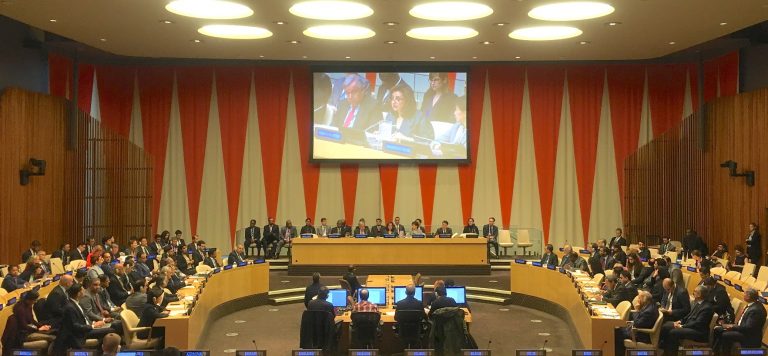The Middle East is a region where nuclear, chemical and biological weapons programs arise from, and contribute to, tensions, instability and conflict.
The 2003 invasion of Iraq was launched by the US and the UK with the stated purpose to ‘disarm Iraq of weapons of mass destruction’ (see ‘Operation Iraq Freedom’, statement by US President Bush) even though no such weapons were subsequently found by the invading forces.
The US and Israel have on a number of occasions made military threats against Iran due to suspicions that Iran intends to use its nuclear energy program to develop nuclear weapons.
Syria has faced international condemnation for using chemical weapons in their civil war and was forced to allow the UN and OPCW in to confiscate and destroy their stockpile of chemical weapons (although there are allegations that Syria still possesses such weapons). Israel has launched military attacks against nuclear energy facilities of both Iraq (1981) and Syria (2018) based on suspicions that these facilities were being used to support clandestine nuclear weapons programs.
And lastly, but definitely not least, the undeclared production and possession by Israel of between 100-200 nuclear weapons further aggravates relations with their neighbours in the Middle East and creates a thorn in the side of the Non-Proliferation Treaty (NPT) – Israel is the only state in the region that has not joined the treaty, much to the annoyance of other Middle East countries.
Proposal for a Zone free of nuclear weapons and other WMD
In this fragile environment, the proposal for a regional treaty to prohibit weapons of mass destruction (WMD) is very attractive, but also very elusive. The proposal is based on nuclear-weapon-free zone treaties that have been adopted in other regions including Africa, Central Asia, Latin America and the Caribbean, the Pacific and South-East Asia. It has been supported by all countries in the region in principle, and has found further support in UN resolutions and decisions of NPT Review Conferences. But negotiations on such a zone have not commenced, primarily due to differences between Israel and the other Middle East (primarily Arab) countries on political conditions for such negotiations. Israel’s position is that a durable peace (i.e. security for Israel as a State) and compliance by other Middle East countries with non-proliferation obligations is required for them to join negotiations for a nuclear-weapons-free zone. Other Middle East countries argue that establishing such a zone would contribute to peace.
An attempt was made by a decision of the 2010 NPT Review Conference to bring all the States in the region together for a conference in 2012 to start the process of establishing a WMD free zone. However, it proved impossible to get agreement between Israel and the Arab states on the mandate and format of the conference, so it was never held.
In light of this, the United Nations General Assembly in 2018 decided to hold a Conference on the Establishment of a Middle East Zone Free of Nuclear Weapons and Other Weapons of Mass Destruction, which could proceed even if one or more of the Middle East countries stayed away. The UN was tasked to hold the first session of the conference in November 2019, with additional sessions annually until the conclusion of a treaty. All Middle East countries were invited to the conference, along with the five states recognised by the NPT as nuclear-armed States, i.e. China, France, Russia, the UK and the USA.
The nuclear-armed States were invited for a number of reasons including that: a) they would need to sign protocols of the negotiated treaty affirming that they would recognise the treaty by not deploying nuclear weapons in the territories of the zone and also that they would not use or threaten to use nuclear weapons against the parties to the treaty; b) they are key states in the NPT which has supported the establishment of the zone; c) they might be able to influence states in the region to participate in negotiations for the zone; and d) they are the permanent members of the UN Security Council which has a key responsibility to maintain international peace and prevent nuclear proliferation.
Who turned up to the conference?
Israel and the USA stayed away, but most other Middle East countries and the other four nuclear-armed states participated. The Conference adopted a Political Declaration expressing support for a continued process to establish a WMD-free Zone and a Final Report which outlined the process of the conference and noted the decision on holding the next conference in 2020.
So what now? Did the conference make a difference? Will the next Middle East WMD-free Zone conference, which is scheduled for November 2020, lead to actual negotiations on a draft treaty establishing a Middle East Zone free of nuclear weapons and other WMD?
It’s not possible yet to determine the answers to these questions. There was definitely no break-through that moved Israel or the United States to announce that they would join this process. But could negotiations start without them? Experience from other NWFZs indicates that this is a possibility. The Treaty of Tlatelolco (Latin America and Caribbean NWFZ), for example was negotiated without a key country – Cuba – and with continuing concerns about the nuclear programs of Argentina and Brazil which remained outside the NPT and IAEA safeguards until 1995 and 1998 respectively. Cuba has now joined the Treaty and all three countries have ratified.
However, would the other Middle East countries be willing to start negotiations on a treaty if Israel was not a participant? Up until this conference, the answer to this appeared to be a definite no. The key countries calling for a Middle East WMD-free zone (Arab countries and Iran) appeared to be doing so in order to put pressure on Israel to join the NPT, and to highlight the double standards in international attention on their nuclear-energy programs, which had not developed nuclear weapons, while seemingly ignoring Israel’s actual production and possession of such weapons. As such, they have not been willing to adopt further obligations under a regional treaty if Israel was not also bound by the treaty. During the conference, a number of participants echoed this perspective and stated that negotiations on such a treaty could not start without Israel.
Iran Ambassador Majid Takht Ravanchi, for example, argued that ‘The rejection of Israel to participate in the conference is a major hurdle in its success. Practically any possible treaty on the establishment of a WMD-free zone in the Middle East will be meaningless and ineffective in the absence of an entity possessing all types of WMD.’ (Israel has not signed the Biological Weapons Convention, and has signed but not ratified the Chemical Weapons Convention).
Ambassador Ravanchi also argued that negotiations for such a zone required the participation of the United States, as the US is ‘a NWS (nuclear-weapon State) whose unconditional, non-discriminatory, effective and irrevocable legal assurance, along with such legal assurances of all other NWS, to all States of the region against the threat or use of nuclear weapons under any circumstances, is an essential requirement for the establishment of a WMD-free zone.’
Others, however, demonstrated a new flexibility not seen previously. Egyptian Ambassador Mohamed Fathi Ahmed Edrees, for example, said that ‘Efforts on disarmament and arms control, particularly with regard to WMDs, should not be contingent upon the attainment of ideal political and security conditions… It is worth mentioning that many such (NWFZ) treaties were negotiated without the participation of a number of parties at the beginning, and that did not prevent the negotiations from being continued and completed or the non-participating parties from joining the negotiations or acceding to the treaties at a later stage. Examples of such cases are plenty.’
So there is a possibility that the conference in 2020 might take the next step and decide to start the negotiations even without the participation of Israel and the USA. Or it might continue to serve as an exchange of views on the establishment of a WMD-free zone and explore the elements of a draft treaty without deciding to start negotiations yet. Either way, a UN process has been started that could take the heat off this issue in the 2020 NPT Review Conference and provide concrete steps toward negotiations of a Middle East WMD-free zone. This is definitely a process to keep an eye on and support.Wholesale Cheap Nike, Jordans, Adidas, Air Max Shoes China Sale Online

